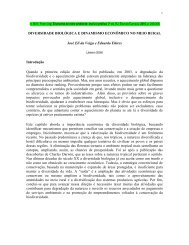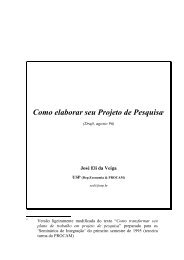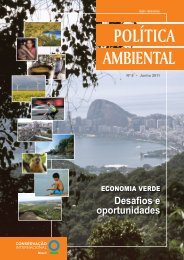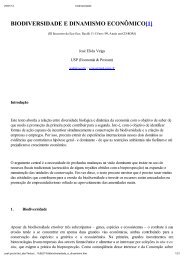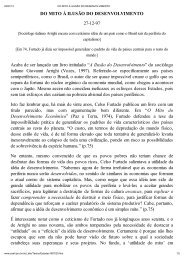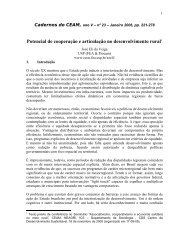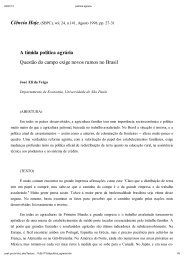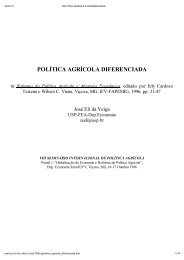sustainable development 20 years on from the ... - José Eli da Veiga
sustainable development 20 years on from the ... - José Eli da Veiga
sustainable development 20 years on from the ... - José Eli da Veiga
You also want an ePaper? Increase the reach of your titles
YUMPU automatically turns print PDFs into web optimized ePapers that Google loves.
219<br />
The benefits for envir<strong>on</strong>mental sustainability of a multilateral, regi<strong>on</strong>al or bilateral system of<br />
intellectual-property protecti<strong>on</strong> are not automatic, but will depend <strong>on</strong> a balanced c<strong>on</strong>siderati<strong>on</strong> of<br />
envir<strong>on</strong>mental, social and ec<strong>on</strong>omic interests. In resp<strong>on</strong>se to envir<strong>on</strong>mentally harmful products or<br />
processes, <strong>the</strong> <str<strong>on</strong>g>development</str<strong>on</strong>g> of more envir<strong>on</strong>mentally benign alternatives will generate corresp<strong>on</strong>ding<br />
intellectual property rights. That is to say, insofar as <strong>the</strong> answer to envir<strong>on</strong>mental problems lies in<br />
technological innovati<strong>on</strong>, <strong>the</strong> current structure of <strong>the</strong> intellectual property regime and internati<strong>on</strong>al trade<br />
rules can provide significant opportunities to innovators, by guaranteeing <strong>the</strong>m <strong>the</strong> right to capture a<br />
proporti<strong>on</strong> of <strong>the</strong> rents arising <strong>from</strong> improved envir<strong>on</strong>mental performance (United Nati<strong>on</strong>s, <str<strong>on</strong>g>20</str<strong>on</strong>g>10b).<br />
N<strong>on</strong>e<strong>the</strong>less, <strong>the</strong> disseminati<strong>on</strong> of new technologies is in practice limited by <strong>the</strong> expanding scope<br />
of <strong>the</strong> internati<strong>on</strong>al intellectual property regime and leng<strong>the</strong>ning of <strong>the</strong> period of protecti<strong>on</strong> specified in<br />
bilateral free-trade agreements <strong>on</strong> this issue. In fact, trade provisi<strong>on</strong>s <strong>on</strong> intellectual property restrict<br />
traditi<strong>on</strong>al methods of reverse engineering and o<strong>the</strong>r forms of imitative innovati<strong>on</strong>; restrict excepti<strong>on</strong>s to<br />
patentability, which particularly affects pharmaceutical and food products; and reduces forms of<br />
compulsory licensing (Schaper, <str<strong>on</strong>g>20</str<strong>on</strong>g>07). All of this could obstruct efforts by Latin American and Caribbean<br />
countries to improve <strong>the</strong>ir technological <str<strong>on</strong>g>development</str<strong>on</strong>g> levels, and to modernize and promote a <str<strong>on</strong>g>sustainable</str<strong>on</strong>g><br />
<str<strong>on</strong>g>development</str<strong>on</strong>g> process. At <strong>the</strong> same time, insofar as some developing countries gradually start to produce<br />
more innovati<strong>on</strong> and scientific research with commercial applicati<strong>on</strong>s, <strong>the</strong>y could also benefit <strong>from</strong> higher<br />
levels of protecti<strong>on</strong> for <strong>the</strong>ir creati<strong>on</strong>s.<br />
At <strong>the</strong> Latin American and Caribbean Regi<strong>on</strong>al Meeting Preparatory to <strong>the</strong> United Nati<strong>on</strong>s<br />
C<strong>on</strong>ference <strong>on</strong> Sustainable Development (Rio+<str<strong>on</strong>g>20</str<strong>on</strong>g>), <strong>the</strong> countries indicated <strong>the</strong> need for commitments to<br />
achieve “effective access to and transfer of safe and appropriate technologies, without c<strong>on</strong>diti<strong>on</strong>alities and<br />
<strong>on</strong> preferential terms for developing countries” and “<strong>the</strong> promoti<strong>on</strong> of a global intellectual property rights<br />
regime that facilitates <strong>the</strong> transfer of such technologies, in keeping with <strong>the</strong> commitments undertaken by<br />
each country” (ECLAC, <str<strong>on</strong>g>20</str<strong>on</strong>g>11b).<br />
C. SCIENCE, TECHNOLOGY AND TECHNOLOGY TRANSFER<br />
After <strong>the</strong> Earth Summit in 1992, <strong>the</strong> World C<strong>on</strong>ference <strong>on</strong> Science (WCS) was held in Bu<strong>da</strong>pest in 1999,<br />
c<strong>on</strong>vened by UNESCO and <strong>the</strong> Internati<strong>on</strong>al Council for Science (ICSU). The two final documents<br />
produced by <strong>the</strong> c<strong>on</strong>ference laid foun<strong>da</strong>ti<strong>on</strong>s for formulating a new social c<strong>on</strong>tract for science. First, <strong>the</strong><br />
Declarati<strong>on</strong> <strong>on</strong> Science and <strong>the</strong> Use of Scientific Knowledge focuses <strong>on</strong> solving problems within science,<br />
technology and society. Sec<strong>on</strong>d, <strong>the</strong> Science Agen<strong>da</strong>: Framework for Acti<strong>on</strong> is a guide to promoting joint<br />
activities in science and technology to fur<strong>the</strong>r <str<strong>on</strong>g>sustainable</str<strong>on</strong>g> human <str<strong>on</strong>g>development</str<strong>on</strong>g>, in harm<strong>on</strong>y with <strong>the</strong> natural<br />
envir<strong>on</strong>ment. Both documents were adopted by c<strong>on</strong>sensus am<strong>on</strong>g all participants at <strong>the</strong> World Science<br />
C<strong>on</strong>ference, and also by <strong>the</strong> General C<strong>on</strong>ference of UNESCO and <strong>the</strong> Internati<strong>on</strong>al Council for Science.<br />
Participati<strong>on</strong> by Latin American and Caribbean countries in <strong>the</strong> World C<strong>on</strong>ference <strong>on</strong> Science<br />
was based <strong>on</strong> <strong>the</strong> Santo Domingo Declarati<strong>on</strong>: Science for <strong>the</strong> Twenty-first Century: A New Visi<strong>on</strong> and a<br />
Framework for Acti<strong>on</strong> (UNESCO, 1999). This stated <strong>the</strong> need to streng<strong>the</strong>n support for science and<br />
technology; break down barriers between <strong>the</strong> natural sciences and social science; and improve educati<strong>on</strong><br />
<strong>on</strong> science and technology to integrate <strong>the</strong>m into general culture and streng<strong>the</strong>n internati<strong>on</strong>al scientific<br />
cooperati<strong>on</strong>. The Declarati<strong>on</strong> explicitly states <strong>the</strong> need to formulate a new social c<strong>on</strong>tract for science<br />
and technology. 15<br />
15<br />
See <strong>the</strong> Santo Domingo Declarati<strong>on</strong> [<strong>on</strong>line] http://www.unesco.org/science/wcs/meetings/lac_santo_domingo_s_99.



